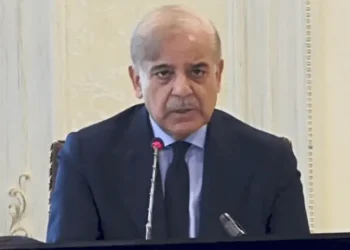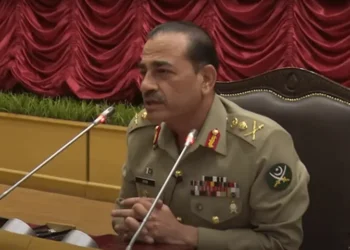LONDON; Muttahida Qaumi Movement (MQM) founder Altaf Hussain, who has lived in self-imposed exile in London since 1992, is currently hospitalised in the British capital due to a “severe illness,” according to party officials.
Altaf, who established the MQM (formerly Mohajir Qaumi Movement) in 1984 to champion the rights of Pakistan’s Urdu-speaking community, has long remained an influential — and often controversial — figure, delivering speeches from London that shaped politics in Karachi for decades.
Senior MQM leader Mustafa Azizabadi confirmed that Hussain has undergone multiple medical tests as doctors work to determine the seriousness of his condition.
In a later video statement, Azizabadi shared that Altaf Hussain’s health had worsened the previous night, leading to his hospitalisation on a doctor’s advice after an examination. “Doctors have carried out multiple tests and are concentrating fully on his treatment,” he said.

Speaking to newsmen afterwards, Azizabadi added that Hussain’s treatment was still underway and expressed hope that “it’s nothing too serious.”
Meanwhile, MQM Coordination Committee Deputy Convener Qasim Ali provided further updates, stating that doctors had recommended a series of tests, including blood work, an ECG, CT scan, X-ray, and ultrasound.
He noted that Altaf Hussain had long been under considerable mental strain due to the political situation at home and abroad, the numerous legal challenges he faces in London, and significant financial hardships.
“Due to this intense stress, doctors have prescribed medication and blood transfusions as part of his treatment, and blood has already been transfused,” Ali added.
Earlier, in a significant legal episode that unfolded in the United Kingdom, Muttahida Qaumi Movement (MQM) founder Altaf Hussain faced terrorism-related charges stemming from a controversial speech he delivered in 2016.
In October 2019, British authorities formally charged Hussain with “encouraging terrorism,” underlining the serious nature of the accusations.
Earlier that year, he had been arrested by London’s Metropolitan Police as part of their investigation into his inflammatory address. However, following his arrest, Hussain was released on bail while the case proceeded through the British legal system.
The prosecution argued that Hussain’s speech amounted to incitement, alleging that his words encouraged violent acts and posed a threat to public safety. The charges were framed under section 1(2) of the UK’s Terrorism Act 2006, which criminalizes the direct or indirect encouragement of terrorist activities. Given Hussain’s longstanding political prominence and the history of tensions linked to MQM’s activities, the case attracted considerable attention both in the UK and Pakistan.

The matter finally reached trial in February 2022 at Kingston Crown Court. Over the course of three days, a 12-member jury carefully considered the arguments presented by both the prosecution and the defense. Prosecutors sought to establish that Hussain’s speech had crossed the line from political rhetoric into unlawful provocation of violence.
Meanwhile, Hussain’s legal team contended that his remarks, though controversial and politically charged, did not meet the threshold of encouraging acts of terrorism under UK law. They argued that freedom of speech protections, especially in the context of political discourse, must be robustly upheld.
After thorough deliberations, the jury ultimately delivered a majority verdict, acquitting Altaf Hussain of all charges. He was found not guilty on both counts of “encouraging terrorism.” This decision effectively cleared him of violating section 1(2) of the Terrorism Act 2006, which had formed the basis of the Crown’s case.
The verdict was met with relief by Hussain and his supporters, who have long maintained that the MQM founder was being unfairly targeted for his outspoken political positions.
In statements to the media following the trial, representatives of the MQM described the acquittal as a vindication of Hussain’s right to express his political views without fear of criminal prosecution. They emphasized that the court’s decision reaffirmed the importance of free speech protections in a democratic society, even when such speech is unpopular or provocative.
However, the case also highlighted broader debates around the balance between safeguarding national security and protecting civil liberties. Legal experts noted that prosecutions under terrorism legislation, particularly those involving speech acts, must meet a high evidentiary standard to ensure that political dissent is not wrongfully criminalized.
While Hussain’s legal ordeal in the UK has concluded with his acquittal, the episode underscored the international dimensions of his political activities and the scrutiny they continue to attract. It also served as a reminder of the complex intersections between diaspora politics, national security concerns, and human rights principles in a globalized world.
With this chapter of legal uncertainty now behind him, Altaf Hussain remains a contentious figure in Pakistani politics, his legacy still deeply intertwined with the volatile history of Karachi and the MQM’s evolution.






































































